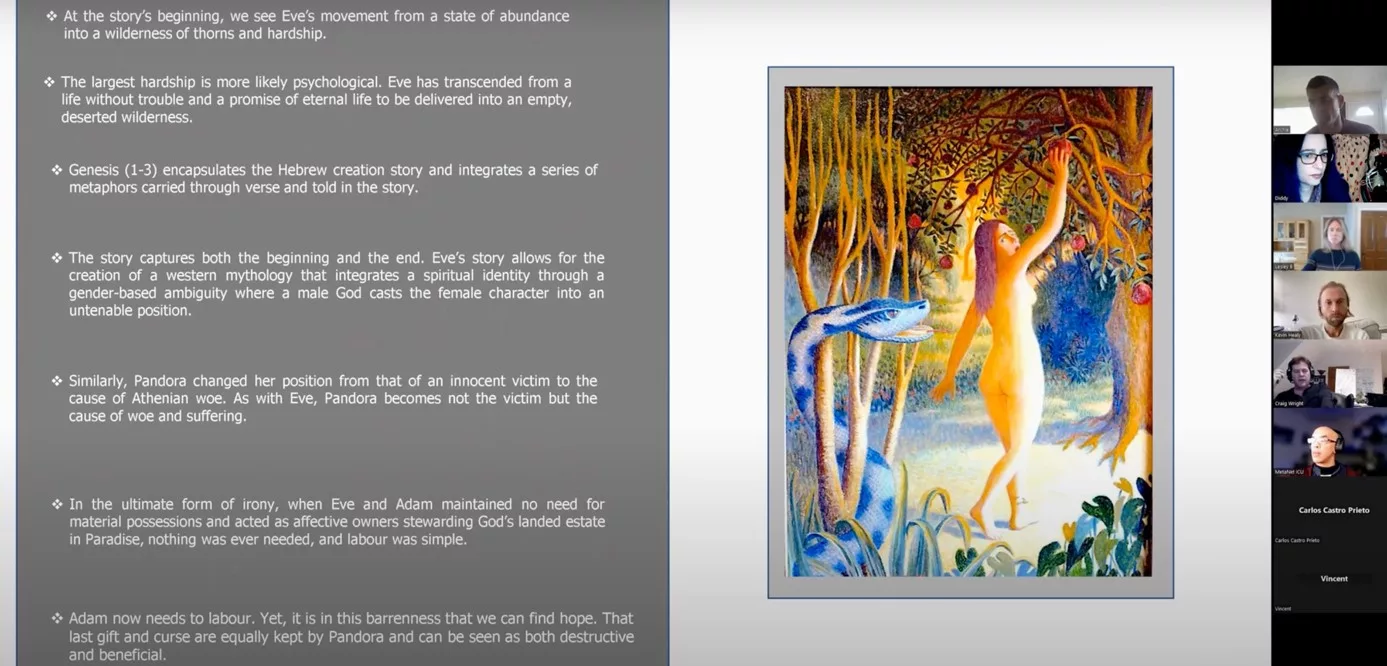|
Getting your Trinity Audio player ready...
|
In early 2023, Dr. Wright said on Twitter that he should be proud of his doctorate in theology. Why would you not be proud of it anyways, one may ask?
According to Dr. Wright, it was very unusual for someone in the information technology space to have academic and personal roots in Christianity when he started his career.
Dr. Wright’s first dissertation, titled “Gnarled roots of a creation mythos,” means a lot to him, though. We may consider this dissertation as Craig Wright’s academic genesis block.
Philosophy class by Dr. Craig Wright with MetaNet ICU members
In a recent episode of the philosophy class run by Dr. Wright, he and the participants discussed the dissertation that was published back in 2003.
“Those in Silicon Valley want to replace the concept of God as we see it with a secular God. And this really still forms God, but it is a different concept in that if we make a computer in the universe and a holographic image – well, into something that we effectively worship whether we say we are or not—then we are still capturing the spiritual. But now we are trying to have an afterlife in the virtual,” Dr. Wright said.
The key point of Dr. Wright’s dissertation in theology seems to be the comparison of the Pandora myth and the Eve myth, as in laying the Greek myths against the Abrahamic myths specifically concerning the role of the woman. In discussion with the MetaNet ICU members, Dr. Wright said:
One of the problems with each of these stories, including some of the analyzes of Eve, is that none of them have been taken as representing a strong supportive woman – neither sort of Pantheon, whether we are talking about Christianity or the Judaic and that of Greco-Roman, represent Eve as equal. Yet, in some ways, you have got to consider that she is different but equal. (…).
If we think for a moment: “It is not Adam that took the apple” – and we can have the typical early medieval sort of scholastic outside of some of the deeper thinkers like Aquinas’ idea, that means “woman bad,” but equally, well, we wouldn’t be here we wouldn’t be human without this choice, so Adam also chooses popping it all onto Eve – well seems a little bit of problem. (…).
God must have known where this would go. If you are omnipotent, then you understand, you see, and not only do you see that Eve would take the apple and Adam would eat from it later, but you also see the birth of the sort of Promise of Resurrection – the ability to then come back, to move into something more.

Source: Slide from the MetaNet ICU philosophy class on YouTubeGnarled roots of a blockchain mythos
Dr. Wright has the talent to combine, extract and distill. Bitcoin has never been “just code” or “just cryptography”—it is a combination of these, plus taking legal frameworks and economics into consideration.
I have had the chance to read multiple excerpts of Dr. Wright’s 2003 dissertation and can verify that even back then, at the beginning of his academic career, he was already able to find unconventional results—for example, summarizing the biblical God’s economic approach to creation in just one sentence.
As soon as Dr. Wright re-publishes his dissertation, we will be able to quote this specific part here on CoinGeek and even put it into the context of Bitcoin. Hence why we said the idea of Bitcoin started in 1998.
Now read the title down there in the context of Bitcoin.
Are not the roots of Bitcoin's creation mythos gnarled, too?
GENESIS BLOCK https://t.co/5wvdfTP6TE
— Michael Wehrmann (@MichaelWehrmann) February 10, 2023
Judeo-Christian sources and Greek mythology?
I am not a theologian or a bible scholar, but I do know that we have parts in the Bible that sound like what we hear from Greek mythology—or both the Abrahamic and Greek realms refer to the same primary source. For example, in the Old Testament (Genesis 6:4 – King James Version):
There were giants in the earth in those days; and also after that, when the sons of God came in unto the daughters of men, and they bare children to them, the same became mighty men which were of old, men of renown.
Giants? Men of renown? Think of Heracles/Hercules. And in the New Testament (Revelation 9:11 – King James Version):
And they had a king over them, which is the angel of the bottomless pit, whose name in the Hebrew tongue is Abaddon, but in the Greek tongue hath his name Apollyon.
Apollyon? Sounds a lot like the Greek deity Apollo; remember the title of Dr. Wright’s first dissertation is “Gnarled roots of a creation mythos”—it begs the question of what the primary source is.
Craig Wright looks at the bases of Western culture
“Zeus did make and did create, but he did not create everything. He made the first woman, he made man, but not the first man ironically. So, he made man of iron, us, where we had to delve and work actually. Yahweh on the other hand (…), we are looking at something that is very different, so we have a larger singular deity in the Abrahamic,” Dr. Wright said in the philosophy class.
Concerning the Greco-Romanic and pre-Judaic timelines, Dr. Wright explained that there too, was the idea of an expulsion from paradise that took us into a world where we have to work (the “iron age”). Dr. Wright does not see the iron age as a curse, though.
“Maybe labor is actually good for us. This really started to develop with the birth of protestant sort of concepts, but the idea that maybe our works are what make us great. We see this in some of the art at the time, the Judgment of Hercules by Gribelin—amazing piece of art—if you see it, what we now have is we choose to work our way through different aspects of sort of birth and rebirth society,” Dr. Wright said.
In an older video, Dr. Wright explained that he considers himself a Wesleyan, which basically means work ethic, with keeping God in mind:
The constant reference from Satoshi to John Wesley can also be found here, for example, when Dr. Wright said that once you get he is a Wesleyan, you understand his philosophy on wealth—also concerning his long-term Bitcoin plans.
Satoshi Nakamoto at the eve of Eve
In the philosophy class, Dr. Wright mentioned that the Abrahamic story revolves around a male God “telling the universe to exist”—in contrast, Pagan religions often feature a female deity who plays a central role in giving birth to everything. According to Dr. Wright, the Abrahamic Eve is misunderstood though:
If God’s purpose is to have a populated Earth, one where we are knowledgeable and wise and stewards of existence, then Eve’s actions can’t be considered a sin. I mean they might be something that is forbidden, but they are equally the creation of all humanity.
It is something that people don’t think about, but it means that the choice of the woman in the society is one that takes humanity beyond just the animal, the ape-like, the beastial and enlightens mankind. I mean as in not just a female choice, but male becomes something more in striving, this way we get more than just the idea of hunt, fight, and now we can build, we can create.
After presenting his dissertation from 2003 to the MetaNet ICU members, Dr. Wright took another 45 minutes to let the participants of the philosophy class ask their questions. That after-class discussion can be seen here.

More philosophy classes by Craig Wright online soon
If you want to join the upcoming philosophy classes, contact Joel Dalais from the MetaNet ICU or Brendan Lee from Elas. Furthermore, you can watch all previous episodes of this educational course by Dr. Craig Wright on this YouTube playlist.
Watch: CoinGeek TV with nChain’s Chief Scientist Dr. Craig Wright

 02-18-2026
02-18-2026 




